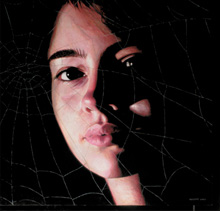[...]
“Sic
Volvere Parcas”.
[Virgilio, Eneide, Proemio]

Clothus

Atropos

Lachesis
[...] “Sic volvere parcas”.
[Virgil, Aeneid]
“So spin the Fates”.
The three fates are masters of everyone’s destiny: the beginning of a life,
its fulfilment, and its inevitable
end. The three supreme mythological figures are in charge of spinning this
fine thread that determines the length of a life, decreeing (without
compunction) when that life has become whole and sufficient - no matter how
brief. It is the trickery of destiny, which imprisons us in its tapestry,
consuming us mercilessly. This inescapable fate seems even more ruthless
when manifested in the seductive Clotho, whose face is illuminated by the
light of youth. Beautiful and inviting, she attracts the eye which traces
circular paths between her eyes and lips, like an insect hovering around a
ripe, juicy piece of fruit. Her delicate and subtle tapestry is her weapon,
reeling in every life which by right belongs to her. The ritual of spinning
and weaving, which have always been associated with divination, magic, and
mythical females, spins forwards as well as backwards.
Clotho has prepared her tapestry which allocates a different fate to each
person.
Lachesis patiently spins, weaving destiny in a slowly and sensuously.
Working on her knees, she turns her smooth shoulders towards the viewer,
backlit by mystical transparency and silken fabrics. In a slow gesture, she
extends the already wound spool of thread, its irrevocably cut end swaying
ever so gently, with the capriciousness of life further emphasised by the
precariously positioned bowl of goldfish. Finally, Atropos severs the
continuity. She is the one in charge of irretrievably tearing the hearts out
of fated souls. Passionate and nervous, she stares glassy eyed at the hot
muscle that has throbbed for an entire lifetime, watching as the impulses
and breath of the life she has chosen to take slip away.
So destiny gets its way,
So spin the Fates,
[...]”Sic volvere parcas.”